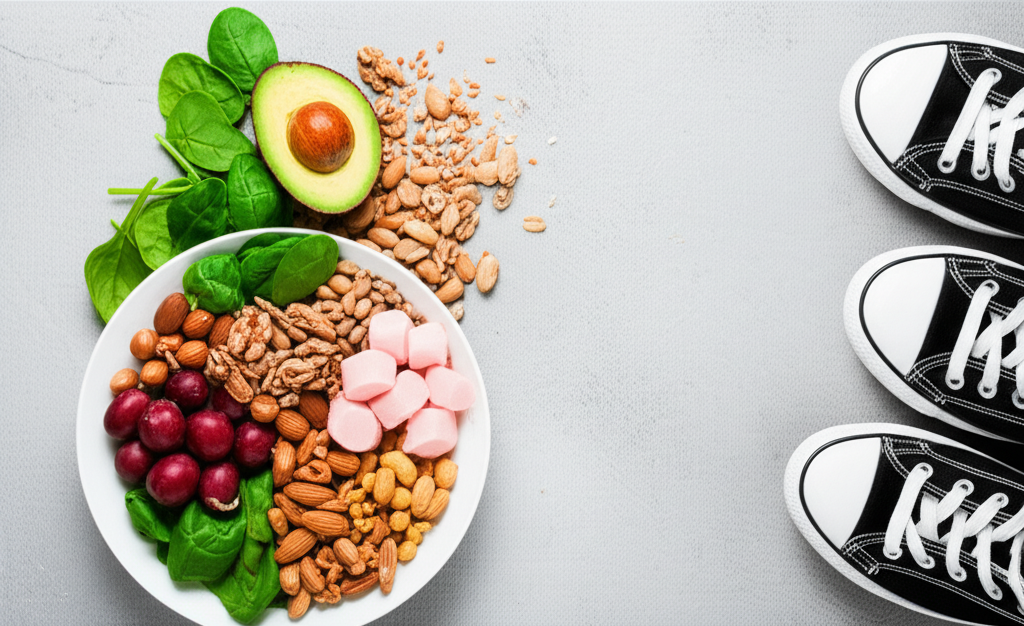How to Gain Weight Naturally Safely – To gain weight naturally and safely, focus on a calorie surplus through nutrient-dense foods, strength training, and consistent healthy habits. This guide offers practical, beginner-friendly tips for sustainable weight gain without resorting to unhealthy methods.
Do you ever look in the mirror and wish for a bit more oomph? Gaining weight can be just as challenging for some people as losing it is for others. It’s not about “getting fat”; it’s about building healthy mass, strengthening your body, and feeling more confident. Many factors, from metabolism to genetics and sometimes even stress, can make it tricky to put on weight. But don’t worry, you’re not alone, and it’s absolutely achievable. This guide is here to walk you through simple, effective, and safe ways to reach your weight gain goals. Get ready to discover how to nourish your body and see real progress!
Why Gaining Weight Can Be Tricky

It might sound counterintuitive, but gaining weight healthily isn’t always as simple as just eating more. For many, their metabolism might burn calories faster than they consume them. Sometimes, underlying health conditions can affect appetite or nutrient absorption. Others may have busy lifestyles that make it hard to eat frequently enough to create a calorie surplus. The key is understanding that it requires a strategic and consistent approach, just like weight loss does. It’s about making smart choices, not just adding empty calories.
Understanding Calorie Surplus for Healthy Weight Gain
At its core, gaining weight is about consuming more calories than your body burns. This is known as a calorie surplus. However, the “how” is crucial for healthy weight gain. Simply eating junk food will lead to unhealthy fat accumulation, not the lean muscle and healthy mass we’re aiming for.
Creating a Sustainable Calorie Surplus
The goal is to add about 250-500 calories per day to your current intake. This gradual increase helps your body adapt and promotes healthy weight gain. Too large a surplus can lead to discomfort and excessive fat gain.
What is a Calorie Deficit?
Conversely, a calorie deficit is when you consume fewer calories than your body burns, leading to weight loss. For weight gain, we must reverse this principle.
Fueling Your Body: Nutrient-Dense Foods for Weight Gain
The quality of your calories matters just as much as the quantity. Focusing on nutrient-dense foods ensures you’re providing your body with the building blocks it needs for muscle growth and overall health, rather than just empty calories.
Healthy Fats: Your Weight Gain Allies
Healthy fats are calorie-dense, meaning they provide a lot of calories in a small amount, making them excellent for weight gain.
- Avocado: Rich in healthy monounsaturated fats and fiber. Add to salads, toast, or smoothies.
- Nuts and Seeds: Almonds, walnuts, cashews, chia seeds, flaxseeds, and sunflower seeds are packed with calories, protein, and healthy fats. Eat them as snacks, sprinkle on yogurt, or blend into nut butters.
- Olive Oil and Coconut Oil: Use these generous amounts in cooking, salad dressings, or drizzle over vegetables.
- Full-Fat Dairy: Whole milk, yogurt, and cheese can be great sources of calories, protein, and calcium.
Protein Powerhouses for Muscle Growth
Protein is essential for building and repairing muscle tissue, which is a key component of healthy weight gain. Aim to include a protein source in every meal.
- Lean Meats: Chicken, turkey, lean beef, and pork provide high-quality protein.
- Fish: Salmon, tuna, and mackerel are not only protein-rich but also contain beneficial omega-3 fatty acids.
- Eggs: A complete protein source, versatile, and easy to prepare.
- Legumes: Beans, lentils, and chickpeas are fantastic plant-based protein sources, also rich in fiber and complex carbohydrates.
- Tofu and Tempeh: Excellent vegetarian and vegan protein options.
- Whey or Plant-Based Protein Powders: Can be a convenient way to boost protein intake, especially in smoothies.
Complex Carbohydrates for Sustained Energy
Carbohydrates provide the energy your body needs to function and fuel your workouts. Opt for complex carbs that offer sustained energy release and additional nutrients.
- Whole Grains: Oats, brown rice, quinoa, whole wheat bread, and pasta.
- Starchy Vegetables: Potatoes, sweet potatoes, corn, and peas.
- Fruits: Bananas, mangoes, and dried fruits are also good sources of healthy carbs and natural sugars.
Smart Eating Strategies for Natural Weight Gain
It’s not just about what you eat, but how and when you eat that can make a significant difference. Consistency is your best friend here!
Eat More Frequent Meals and Snacks
Instead of three large meals, try eating five to six smaller meals and snacks throughout the day. This can help you consume more calories without feeling overly full or uncomfortable.
Don’t Skip Meals, Especially Breakfast!
Breakfast is a crucial opportunity to start your day with a calorie and nutrient boost. Skipping meals makes it harder to reach your daily calorie target.
Add Calorie Boosters to Your Meals
Small additions can significantly increase your calorie intake:
- Add a tablespoon of olive oil or butter to vegetables or rice.
- Top your yogurt, oatmeal, or cereal with nuts, seeds, and dried fruit.
- Add cheese to sandwiches, eggs, or soups.
- Blend nut butter into smoothies or spread on toast.
Drink Your Calories (Wisely!)
While it’s important to stay hydrated with water, you can also use beverages to increase calorie intake.
- Full-fat milk or plant-based alternatives: Great on their own or in smoothies.
- Smoothies: Blend fruits, vegetables, protein powder, nut butter, oats, and yogurt or milk for a calorie-packed drink.
- Avoid filling up on water right before meals: This can reduce your appetite.
The Role of Strength Training in Healthy Weight Gain
For those looking to gain weight and build a strong, toned physique, strength training is non-negotiable. It helps ensure that the weight you gain is primarily lean muscle mass, not just fat.
Why Lift Weights?
When you lift weights, you create tiny tears in your muscle fibers. Your body then repairs these tears, making the muscles stronger and larger. This process requires energy (calories) and protein.
Beginner-Friendly Strength Training Routine
Start with basic compound exercises that work multiple muscle groups at once. Aim for 2-3 full-body workouts per week, with at least one rest day in between.
Example Beginner Workout Schedule
Here’s a sample of how you might structure your week. Remember to consult with a healthcare professional or certified trainer before starting any new exercise program.
| Day | Activity | Focus |
|---|---|---|
| Monday | Full Body Strength Training | Squats, Push-ups (or knee push-ups), Lunges, Dumbbell Rows, Plank |
| Tuesday | Rest or Light Activity | Walking, stretching |
| Wednesday | Full Body Strength Training | Deadlifts (with light weights and proper form), Overhead Press, Bent-Over Rows, Crunches |
| Thursday | Rest or Light Activity | Yoga, cycling |
| Friday | Full Body Strength Training | Bench Press (or dumbbell press), Pull-ups (assisted if needed), Leg Press, Bicep Curls, Back Extensions |
| Saturday | Active Recovery | Long walk, light hike |
| Sunday | Rest | Completely relax and recover |
Progressive Overload: The Key to Growth
To keep seeing results, you need to gradually increase the challenge over time. This can be done by:
- Increasing the weight you lift.
- Doing more repetitions with the same weight.
- Doing more sets of an exercise.
- Decreasing rest time between sets.
Proper Form is Crucial
Focus on performing each exercise with correct form to prevent injuries and maximize effectiveness. Watching videos from reputable sources like the National Strength and Conditioning Association (NSCA) can be very helpful.
Sample Weekly Meal Plan for Natural Weight Gain
This is a sample plan and can be adjusted based on your preferences, dietary needs, and calorie goals. The key is to ensure each meal and snack is nutrient-dense and contributes to your calorie surplus.
Sample Daily Intake Example (Approx. 2500-3000 Calories)
| Meal | Monday | Tuesday | Wednesday | Thursday | Friday | Saturday | Sunday |
|---|---|---|---|---|---|---|---|
| Breakfast | Oatmeal with 1 scoop protein powder, 1 banana, 2 tbsp almond butter, 1 cup whole milk | 3 Scrambled Eggs with cheese, 2 slices whole-wheat toast with avocado. | Smoothie: 1.5 cups whole milk, 1 scoop protein powder, 1 banana, 1/4 cup oats, 2 tbsp peanut butter. | Pancakes (made with whole wheat flour and milk) with berries and a drizzle of honey. | Greek Yogurt (full-fat) with granola, mixed berries, and 1 tbsp chia seeds. | Oatmeal with 1 scoop protein powder, 1 apple, 2 tbsp walnuts. | 3-Egg Omelet with spinach and cheese, 2 slices whole-wheat toast. |
| Mid-Morning Snack | Handful of almonds and a pear. | Cottage cheese (full-fat) with pineapple chunks. | Hard-boiled eggs (2) and a small bunch of grapes. | Rice cakes (2) with peanut butter. | Trail mix (nuts, seeds, dried fruit). | Apple slices with 2 tbsp almond butter. | Full-fat yogurt with a handful of berries. |
| Lunch | Grilled chicken breast (6oz) with 1 cup brown rice and steamed broccoli with olive oil. | Tuna salad sandwich on whole-wheat bread (made with mayo, not light). Serve with a side salad. | Lentil soup (hearty) with whole-wheat bread and butter. | Salmon fillet (5oz) with 1 cup quinoa and asparagus. | Lean beef stir-fry with mixed vegetables and brown rice. | Chicken and vegetable skewers. Serve with a sweet potato. | Leftovers from Saturday’s dinner. |
| Afternoon Snack | Protein shake (milk, protein powder, banana). | Banana with 2 tbsp peanut butter. | A glass of whole milk and a handful of cashews. | Energy bar (choose one with good protein and calorie content). | Avocado toast on whole-wheat bread. | Hard cheese and whole-grain crackers. | Smoothie: 1 cup whole milk, 1/2 cup berries, small handful spinach. |
| Dinner | Lean ground beef casserole with potatoes and vegetables. | Baked chicken thighs (2) with roasted sweet potatoes and green beans. | Pork tenderloin (5oz) with mashed potatoes and a side salad. | Whole wheat pasta with meat sauce and a side of garlic bread. | Baked cod (6oz) with roasted root vegetables (carrots, parsnips). | Homemade chili with beans and lean ground turkey/beef. | Roast chicken (breast and thigh) with roasted potatoes and Brussels sprouts. |
| Evening Snack (Optional) | Glass of whole milk. | Small bowl of full-fat yogurt with honey. | A few dates and a small handful of walnuts. | Peanut butter on a rice cake. | Warm milk with a tablespoon of honey. | Cottage cheese with fruit. | A small protein shake. |
Lifestyle Habits for Optimal Weight Gain
Beyond diet and exercise, certain lifestyle factors can significantly support your weight gain journey.
Prioritize Sleep and Recovery
Muscle growth and repair happen primarily during sleep. Aim for 7-9 hours of quality sleep per night. Adequate rest also helps manage stress hormones, which can impact appetite and metabolism.
Manage Stress Levels
Chronic stress can lead to poor appetite and digestion. Find healthy ways to manage stress, such as mindfulness, meditation, yoga, or engaging in hobbies you enjoy.
Stay Hydrated, But Strategically
While water is essential, drinking too much right before or during meals can fill you up and reduce your appetite. Sip water between meals to stay hydrated without impacting your food intake.
Be Patient and Consistent
Healthy weight gain is a gradual process. Don’t get discouraged if you don’t see results overnight. Consistency with your eating habits, exercise routine, and lifestyle choices is key. Celebrate small victories along the way!
Common Pitfalls to Avoid
It’s easy to fall into traps when trying to gain weight. Here are some common mistakes to steer clear of:
- Eating Too Much Junk Food: This leads to unhealthy fat gain and can negatively impact your health.
- Skipping Strength Training: Gaining weight without muscle means more fat, which isn’t ideal.
- Inconsistency: Sporadic efforts won’t yield sustainable results.
- Not Eating Enough Protein: Protein is vital for building muscle mass, not just any weight.
- Overdoing Cardio: While some cardio is good for overall health, excessive amounts can burn too many calories needed for gain.
Frequently Asked Questions (FAQ) About Natural Weight Gain
Q1: How much weight can I realistically expect to gain per week?
A healthy and sustainable rate of weight gain is typically 0.5 to 1 pound per week. This allows your body to adjust and ensures most of the gain is lean muscle mass.
Q2: Should I focus on gaining weight or building muscle?
For overall health and a well-proportioned physique, it’s best to focus on gaining weight and muscle simultaneously. This involves consuming a calorie surplus with sufficient protein and incorporating strength training.
Q3: Can I gain weight naturally at home without special equipment?
Yes! You can gain weight naturally at home. Focus on nutrient-dense eating, plenty of calorie-rich snacks, and bodyweight exercises or use everyday household items for resistance if you don’t have weights. Consistency is more important than fancy equipment.
Q4: What if I have a naturally fast metabolism?
Individuals with fast metabolisms need to be even more diligent about their calorie intake. Prioritize frequent, calorie-dense meals and snacks throughout the day. Don’t underestimate the power of adding healthy fats and protein to every meal.
Q5: Is it possible to gain weight too quickly? What are the risks?
Gaining weight too quickly, especially through excessive unhealthy food intake, can lead to rapid fat accumulation, increased risk of heart disease, diabetes, and poor energy levels. A gradual, steady approach is always safer and more beneficial.
Q6: How long will it take to see results?
Results vary from person to person based on genetics, metabolism, consistency, and the starting point. You might start noticing changes in a few weeks, but significant, sustainable results typically take a few months of consistent effort.
Conclusion
Embarking on a journey to gain weight naturally and safely is empowering and achievable. It’s about nourishing your body with the right nutrients, challenging it with strength training, and building consistent healthy habits. Remember, this isn’t about chasing a number on the scale, but about building a stronger, healthier, more energetic you. By focusing on calorie-dense, nutrient-rich foods, incorporating regular strength training, and prioritizing rest and recovery, you are laying the foundation for sustainable progress. Be patient with yourself, celebrate every step forward, and trust that with dedication and the right approach, you absolutely can reach your weight gain goals. You’ve got this!



